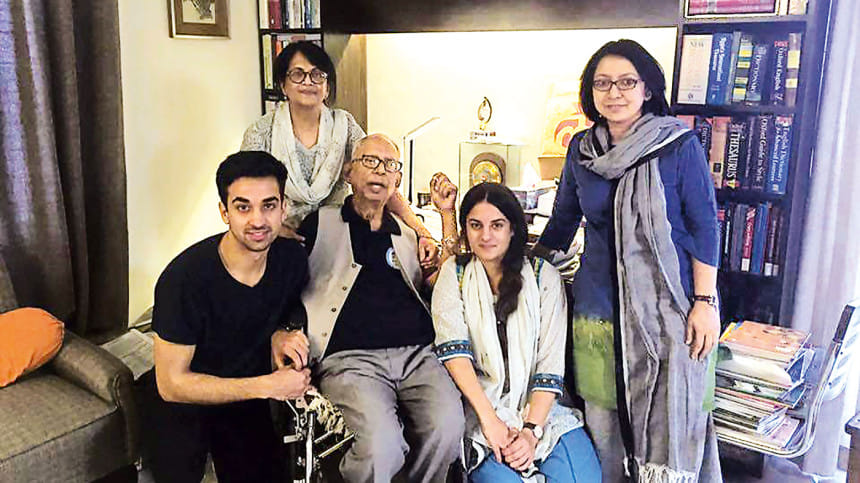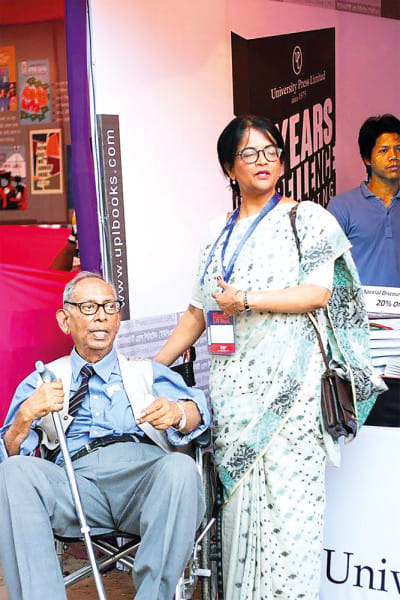Remembering Mohiuddin Ahmed, the founder of UPL

Countless people cross our path as we walk through this temporal life; but only one or two strike us as people with no darkness within. Mohiuddin Ahmed was one of those unique humans. He radiated pure light, and for those within this light, time always moved peacefully because life seemed to have met all his wants and needs, and as a man so at ease with the ways of life, he effortlessly smoothed out the many negative thoughts of his visitors and friends, just by being who he was.
Nadia (Mahrukh) had texted me about his deteriorating condition a few hours before his passing. I had known he was unwell, but it was still difficult for me to cope with that news. I went out walking in the countryside, keeping my thoughts at bay. While I was out, the final text came. For a second everything went blurred, even though the Nordic sun was bright and strong. My legs bent, and I had to sit by the path in the shade of a tree. It was hours before I could walk back home.
Since then, I have been trying to come to terms with this grief and loss. On his first family memorial service on Zoom, I was a dumb participant, even though many words were bubbling in my head. It has taken me months to collect myself to write my thoughts about UPL's founder, Mr Mohiuddin Ahmed, my publisher, later my friend, my Chacha and champion, my favourite person in Dhaka. Had he been older, I would have dubbed him my second dad.
I first met him on July 20th, 2005, at his Motijheel office. I had gone to see him with the manuscript of A List of Offences and my translation of my father, Shahed Ali's stories. I also carried with me a bunch of letters from various reputed US and UK publishers on my manuscript. Mohiuddin Ahmed was very busy in his room, so I had to wait a while before he could receive me. He was slim, tall and well dressed: a striped tie and a vest on a pressed white shirt, his face smoothly shaven under his silvery hair, his spectacles spotless, his shoes shining, his hands clean.

The series of impressions he made on me I found initially to be confusing, but shortly they began to level out. It was at that point our liaison could begin to grow, something permanent in the making. He looked over his spectacles and asked me what he could do for me. I explained why I was there and handed him the documents I had with me. He nodded a few times, flicking through the papers, and then asked me to wait in the reception. Whereupon he shut himself with everything in his office room. I spent hours browsing through the bookshelves of the house before he called for me.
It was a neat room that smelt of books, wisdom and olden times. There was a set of sofas before his desk. He invited me to take a seat, while he himself sat opposite me. He had a reassuring expression on his face, and I remember him laying the contract on the table and offering me a pen. He kept his eyes fixed on the document as I read through it. He must have had read the doubts on my face. As soon as I was ready, he declared with the confidence of any great leader that he knew what he was doing and that I shouldn't worry. Later, as I got to know him, I found out that it was one of his virtues to follow his gut feelings and never to stall matters that he somehow knew would be beneficial for his publishing house.
Having signed the deal, I joined him for lunch, which had been brought from his home. During that space of time, I mentioned that I had some of Abba's stories in English ready. He had never met my father but knew who he was. Without a second thought, he took the collection as well. Thus began our relationship, which turned to be one of a kind. In retrospect, I think the uniqueness rested on the fact he made me feel exclusive – when he was with me, he never mentioned anyone else or showed interest in anyone else's works.
Since then, we spoke frequently on the phone, and I met him regularly during my visits to Dhaka, which was often more than once per year. Apart my mother, he was the only person in Dhaka with whom I would spend my time. Because Motijheel was far away from Banani, where my family home is, Chacha would usually pick me up in his microbus – literally a mobile office – on his way to the UPL.
While we navigated through Dhaka's maddening traffic, he worked on manuscripts, signed documents, made phone calls and in between his official work shared with me memories from his student life in Punjab. He sang ghazals and recited poems by Shakespeare, and he described and impersonated episodes from his time in the dorm. Sometimes, he would stop the van when we passed by fruit-wallahs and get me some fruit. Once he got me a couple of Arong mugs from a roadside vendor. During his recesses, we would share coffee and lunch, and discussed literature and music. And when he was busy, I would walk through his bookstore or sit there reading and writing. This was our standard routine whenever I went to Dhaka.
In the span of the next few years, Chacha's health slowly deteriorated. Parkinson's started eating him from inside, but with the courage of a soldier, he faced it and refused to let it affect his mind and life. When Nadia returned from the States in 2014 and started the UPL branch office in Badda, Chacha took me there to introduce me to her.
Thereafter I would meet Chacha, either in Badda or at his home in Gulshan, where I also got to know Chachi and Nadeem. I had free access to Chacha's room, and when he couldn't greet me in the living room, I would sit by his bed and speak with him or listen to him. Thus, I also witnessed his bond with each of his family members, including the people who worked for him. He was always the same decent human being who believed in equality and never for a second misused his authority.
The day he became Emeritus Publisher, he picked me up from my home in Banani and I was the privileged one he tried out his speech on, enroute to the Bangla Academy to receive his prize.
There are several noteworthy memories, and among those one was in 2016. During one of our luncheons, I happened to mention that my mother was unwell so I might not be able to visit him the following day. Chacha listened silently, but later in the evening, he suddenly called me to say he wished to pay my mother a visit. I told him that he couldn't do that because we had no lift, and Chacha was wheelchair bound. But he wouldn't listen to me. He would go up the stairs at any price. Finally, I had to give in; together with his attendance I had to help him up to the second floor, where my mother lived. It was an arduous task and time consuming. He was exhausted, and I had tears in my eyes as I sat him in our living room where my mother was already present to greet him. They chitchatted a while. Going down was even more laborious for Chacha than climbing up, but he bore it with dignity.
Last year, after Chacha's recovery from Covid, Nadia arranged a video meeting for us, and I was grateful that he had beaten the virus. Little did I suspect that he would go so soon.
Chacha met my children, Navid and Tania, in 2015 when we were in Dhaka for the launch of my novel Blame during the Lit Fest. One single phone call from him brought them permission to visit our National Assembly building, designed by Louis Khan. It was an experience Navid, who is an architect, will cherish for the rest of his life. When Tania was elected as the editor of Stockholm's Royal Technical College magazine, Chacha was the first to send her a congratulatory letter, another testimony to his uniqueness.
I have tried here to portray Mohiuddin Ahmed as a human being. Many have already spoken of his role as a publisher, and I have nothing new to add to that – except that the Swedish translation of my novel List of Offences is going to be published in Sweden by another reputed publisher, who has been as quick as Chacha to appreciate it. I am saddened that Chacha is no longer here to experience the responses to the book which had brought us together.
Dilruba Z. Ara is an internationally acclaimed Swedish-Bangladeshi writer, novelist, translator, artist and educator. She lives and works in Lund, Sweden, and writes from there. To know more about her, visit www.dilrubazara.com

 For all latest news, follow The Daily Star's Google News channel.
For all latest news, follow The Daily Star's Google News channel. 



Comments